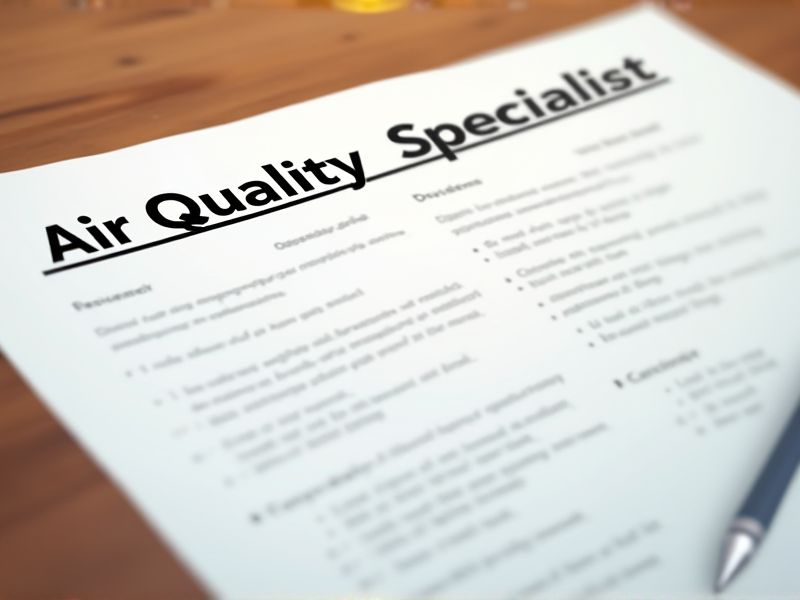
Air Quality Specialists assess and monitor environmental pollutants to ensure compliance with health and safety regulations. Certifications validate their expertise in handling complex sampling techniques, interpreting data, and implementing pollutant control measures. Employers often require specific credentials to demonstrate proficiency in both regulatory knowledge and technical skills. Key certifications that may be necessary for an Air Quality Specialist include...
Certified Air Quality Professional (CAQP)
Demand for clean air regulations increases due to rising pollution levels, necessitating expertise from a Certified Air Quality Professional (CAQP). CAQPs possess specialized knowledge in monitoring and analyzing air pollution sources, providing essential insights for effective mitigation strategies. Regulatory compliance often requires precise assessments and reporting, tasks for which CAQPs are uniquely qualified. Hiring a CAQP ensures the use of industry-standard practices, reducing risks of non-compliance penalties and promoting public health.
Certified Industrial Hygienist (CIH)
Certified Industrial Hygienists (CIHs) provide the expertise needed to accurately assess air quality hazards, ensuring compliance with established health standards. Their specialized training equips them to identify, evaluate, and control environmental exposures that could adversely affect worker and public health. CIHs use advanced methodologies to devise effective air quality management strategies, minimizing potential risks. Proper certification ensures these professionals adhere to the latest industry practices and regulatory requirements, which optimizes safety outcomes.
Certified Indoor Environmentalist (CIE)
Improved indoor air quality standards often result from hiring Certified Indoor Environmentalists (CIE) due to their specialized training. CIEs possess expertise in identifying, assessing, and resolving air quality issues, which reduces health risks associated with poor indoor environments. Regulations around air quality management increasingly demand certified professionals, making CIEs essential to compliance. Companies investing in CIEs often notice enhanced employee productivity and reduced absenteeism due to healthier environments.
EPA Air Quality Manager Certification
Achieving EPA Air Quality Manager Certification equips an Air Quality Specialist with a comprehensive understanding of federal regulations and standards, enhancing their ability to comply with legal mandates. Certified specialists are better positioned to develop effective strategies for monitoring and controlling pollutants, leading to improved public health outcomes. Employers often prioritize certified candidates, recognizing their validated expertise and competence in managing complex air quality issues. Certification can also facilitate career advancement by demonstrating a commitment to professional development and excellence in the field.
OSHA 30-Hour General Industry Training Certification
Air Quality Specialists often work in environments that might expose them to hazardous materials, making safety training critical to mitigate risks. The OSHA 30-Hour General Industry Training Certification provides in-depth knowledge about workplace safety standards and practices, enhancing an individual's ability to identify and manage environmental hazards effectively. Understanding OSHA regulations is essential for Air Quality Specialists to ensure compliance with federal safety standards, thereby reducing potential liabilities for employers. Comprehensive safety training contributes to creating safer work environments, which is beneficial for both the employees and the organization in long-term operational efficiency.
Certified Hazardous Materials Manager (CHMM)
Air Quality Specialists often encounter hazardous substances and pollutants, making the expertise of a Certified Hazardous Materials Manager (CHMM) crucial in safely handling and mitigating these materials. Proper understanding and management of these materials are necessary to ensure compliance with environmental laws and minimize health risks. CHMMs possess the knowledge required for creating effective contamination response strategies, aiding Air Quality Specialists in safeguarding public health. Data-driven assessments by CHMMs can enhance air quality monitoring, ensuring the implementation of best practices and standards in pollution control.
Certified Environmental Professional (CEP)
The presence of a Certified Environmental Professional ensures compliance with regulatory standards, as expertise in environmental laws and policies is critical for managing air quality. The CEP designation provides a benchmark for competence, helping organizations trust the professional's ability to assess and mitigate air pollution effectively. With specialized training, CEPs bring advanced knowledge in monitoring and analyzing air quality data, enabling more accurate predictions and responses. Companies and agencies benefit from the strategic guidance of CEPs, which aids in reducing environmental impacts and avoiding potential legal issues.
LEED Accredited Professional (LEED AP)
Having a LEED AP credential equips an Air Quality Specialist with validated expertise in green building practices, ensuring healthier indoor environments. This credential helps specialists understand and apply LEED's rigorous indoor environmental quality (IEQ) standards, which prioritize air quality. Enhanced knowledge of IEQ factors improves the specialist's capability to assess and mitigate air pollutants effectively. LEED APs contribute to sustainable projects by integrating air quality solutions that align with LEED certification requirements.
Certified Safety Professional (CSP)
Air Quality Specialists often work in environments where hazardous pollutants are present, necessitating risk assessment skills; the CSP certification provides these skills. Regulatory compliance requires that safety protocols are diligently followed, and the CSP certifies expertise in these areas. CSP designation enhances professional credibility, which can lead to greater trust from stakeholders and decision-makers in projects. Specialized knowledge in safety standards gained through CSP certification aids in designing effective air quality management plans that protect public health.
Construction Health and Safety Technician (CHST)
Promotes a safe work environment by ensuring air quality standards are met, reducing exposure to harmful pollutants. Identifies potential hazards that could affect respiratory health and implements strategies to mitigate risks. Monitors compliance with safety regulations, contributing to a healthier workspace for all employees. Enhances overall project efficiency by minimizing disruptions caused by air quality-related health issues.
Summary
When you obtain certifications as an Air Quality Specialist, your expertise is recognized more formally, enhancing your professional credibility. This increased credibility can lead to more job opportunities and potentially higher salaries. Employers tend to favor certified specialists for complex projects, as certifications signify a commitment to industry standards. Certification can also expand your knowledge base, leading to more effective problem-solving in various environmental contexts.
